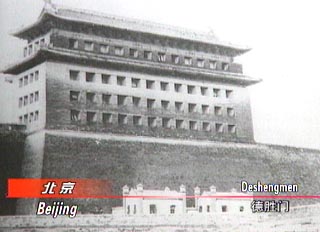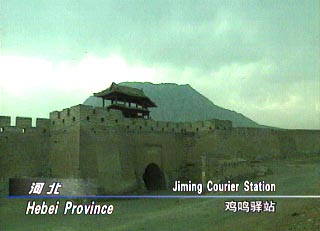 |
|
Delayed Reform (1)
Empress Dowager Cixi Going into Exile  |
| CCTV.COM 2002-05-17 10:05:15 |
|
 Deshengmen Gate was the triumphal arch for the imperial army of the Qing Dynasty. On August 15, 1900 when the Eight-Power Allied Forces stormed into Beijing, Empress Dowager Cixi, disguised as a peasant woman, went into exile from here. It was a rainy day. Deshengmen Gate was the triumphal arch for the imperial army of the Qing Dynasty. On August 15, 1900 when the Eight-Power Allied Forces stormed into Beijing, Empress Dowager Cixi, disguised as a peasant woman, went into exile from here. It was a rainy day.
The road was rugged and muddy. Cixi and her entourage ate in the wind and slept in the dew, suffering from hunger and cold.
Two days later, the Empress Dowager had mung bean and millet porridge as a meal. She was very grateful to Wu Yong, the county magistrate who provided food and drink for her. So Wu Yong was promoted and the prefectures and counties where the Empress Dowager stopped over were exempted from taxes for the year. Later Wu Yong described the Empress Dowager's embarrassment in his book "Collected Writings of Xishou".
The ruler was in such a predicament, though she had the supreme power. The common people in the capital were in much greater misery.
When the Emperor and the Empress Dowager were making a long, difficult journey, one-year-old Lao She became fatherless. Later he emerged as a writer.
"The Japanese troops had invented incendiary bombs. The Chinese army used the black gunpowder. A ball of fire came. It certainly touched off a sea of flames here. My grandfather suffered severe burns while defending Zhengyangmen Gate. He got to Nanhengyu Grain Shop. It was at the north end of Nanchang Street near Xihuamen Gate. When the situation improved a bit, we took a cart to Nanchang Street to look for him. He was missing. So my grandfather was nowhere to be found. "said Shu Yi, son of Lao She, the deputy curator of Modern Literature Museum.
Lao She's family was not the only one with painful reminiscences. The capital fell into the enemy hands. The people lived in horror and despair. In his diary, Chong Xing, manager of Tong Ren Tang Chinese Pharmacy, described the disaster of the common people in Beijing.
The arrogant Eight-Power Allied Forces commanding the situation in Beijing refused to negotiate peace. More than one thousand officials of the imperial court committed suicide.
 At Jiming Courier Station on August 20, Empress Dowager Cixi received more and more news from the capital. As the key figure who had caused the disaster, she was in an extremely awkward situation. As described in historical records, she was ashamed and angry. She issued an imperial edict to blame herself. At Jiming Courier Station on August 20, Empress Dowager Cixi received more and more news from the capital. As the key figure who had caused the disaster, she was in an extremely awkward situation. As described in historical records, she was ashamed and angry. She issued an imperial edict to blame herself.
On October 2, Cixi came to an ordinary house, Cao family, in Shanxi Province during her westward journey. She had lived in the imperial palace for so many years. Now she was among the common people only because she was in exile.
Today the Cao family still keeps a platinum locomotive model. It was a gift granted by Cixi to the Cao family for its hospitality. That year North China was affected by a severe drought. Cixi was shocked by what she saw and heard during the journey. Later she sternly asked the ministers why they had not told her and the Emperor about the actual conditions of the people.
Time was relentless. A beautiful imperial concubine became an old Empress Dowager. Seventy-year-old Cixi changed a bit because China had been defeated in the war and she had been forced to go in exile. Quietly she picked up the new policies strangled by her in the Reform Movement of 1898. In January 1901, she issued an imperial edict in Xi'an, declaring that she would initiate reform. This was the last hope for the declining dynasty.
|
|
|
|
|
|
|
 |









